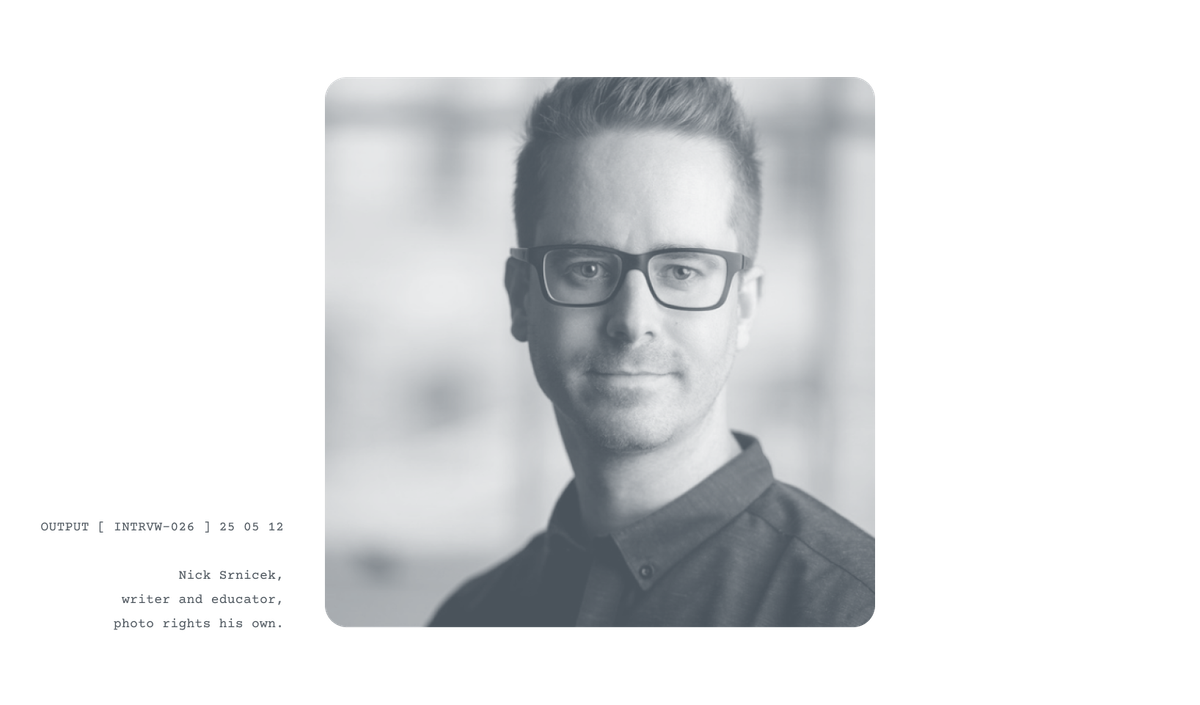Nick Srnicek, Writer and Educator

Nick Srnicek is the writer behind Platform Capitalism, Inventing the Future (co-written with Alex Williams), and After Work (co-written with Helen Hester), and a Senior Lecturer in Digital Economy at King's College London.
APOSSIBLE™ is a non-profit bringing psychologists, technologists, artists and creatives together to explore how technology can better support creativity and human fulfillment. In this ongoing interview series we’re discovering what people value, what makes their lives fulfilling, and what kinds of relationships to technology they already cherish.
1. What is a ritual, practice, or routine in your life that is important for your psychological wellbeing and/or fulfillment? Why?
For most of my life I despised running – but in recent years it’s become an important ritual for me. Both mentally and physically, the act of running has been quite beneficial to me. Mentally, it gives me space and time away from any other distractions, letting my mind wander creatively down paths it might not have otherwise taken.
While I appreciate contemporary technology in many ways, I do think it’s important to have periods of distance from it. Physically, as I’ve gotten older – and as my children have gotten bigger! – I’ve become much more aware of the frailty of the human body. Running has allowed me to keep in shape and, importantly for me, keep up with my kids as they play.
2. What is a human-made creation that brings out the best in you? Why?
If I were to answer in an instrumental way, my laptop and the various pieces of software on it would be my answer – they are very much, to use a well-known phrase, my second brain and I believe my thinking is significantly improved with their assistance.
But less instrumentally, I would say music. I’ve always been a crate digger – does that phrase still work? – and I’ve always received a lot of enjoyment from discovering new music. That still holds today, even if I don’t have the same amount of time as I once did to listen to every new recommended record. For me there’s nothing quite like finding a piece of music that eloquently evokes a particular affect or state of mind.
3. When do you cherish the slow or hard way of doing something? Why?
Reading is something which for me demands time and effort, and for which there are no meaningful shortcuts. The whole field of generative AI summaries for texts is for me complete nonsense – even a perfect summary will miss the details of arguments, the interweaving of claims, and the gaps and tensions of a piece of writing. A summary cannot and will never be a lossless compression. There is no way of properly understanding a text without in fact reading it deeply and thoughtfully.
4. What is something you appreciate or long for from the past? Why?
It is undoubtedly idealised in my memory now, but my time doing a PhD was something I really appreciated. It was a space where external responsibilities were at a minimum, and where intellectual pursuits were primary, but also a space where I was fortunate enough to have a community of fellow students that would debate ideas endlessly, commiserate over life’s challenges, and celebrate each other’s achievements.
